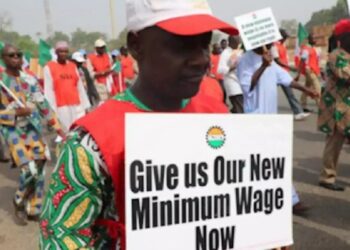The Nation
7 states, FCT fail to approve new minimum wage

At least seven Nigerian states and the Federal Capital Territory (FCT) have not approved the new minimum wage scheduled to start in October, raising concerns among civil servants over economic hardship.
Currently, 25 states have either begun payments or announced their respective minimum wage levels. However, Zamfara, Sokoto, Osun, Cross River, Imo, Plateau, Taraba, and the FCT are yet to finalize a set amount.
In Zamfara, the adoption of the N70,000 minimum wage may face delays, as the state only recently started paying the previous N30,000 wage.
The N30,000 benchmark, established in April 2019, was not implemented until Governor Dauda Lawal initiated payments in June this year. Zamfara has yet to make an official statement on the N70,000 figure.
Sokoto State, despite a pledge from Governor Ahmed Aliyu to be among the first to adopt the new minimum wage, has also not commenced payment.
READ ALSO :Nigerian gov approves N80,000 minimum wage for workers
Osun State Governor Ademola Adeleke previously announced his administration’s commitment to pay the minimum wage, but no amount has been specified, nor has payment started.
The Trade Union Congress (TUC) Chairman in Osun, Bimbo Fasasi, who is part of the wage negotiation committee, said on Thursday, “We are getting there, we are at the stage of comparing tables and exchanging tables between us. I’m confident we will soon have a meeting point and we will be able to make formal announcements and implementation will most definitely follow immediately.”
In Cross River, approval for the N70,000 minimum wage remains pending. Governor Bassey Otu announced a N40,000 minimum wage for civil servants in May 2024. TUC Chairman Monday Ogbodum confirmed that negotiations with the state government on the national minimum wage are ongoing.
In Imo, the new minimum wage has yet to be implemented, though Governor Hope Uzodimma assured workers of his administration’s commitment. TUC Vice Chairman Charles Amaru shared that discussions are underway, adding, “The organised labour is still discussing with the state government on the template for payment. The discussion is prone to having fruitful outcomes, and the government has said that everyone will be comfortable with the amount that will be paid.”
In Plateau State, no official communication on the new minimum wage has been made. Similarly, Taraba has not started the N70,000 payments. Governor Agbu Kefas previously indicated willingness to adopt the new wage, noting that discussions were ongoing with the Head of Service and labor representatives.
Meanwhile, the FCT administration has remained silent on the new wage implementation as of this report.
Workers nationwide continue to voice frustration over the rising cost of living, stating that the N70,000 wage is insufficient amid increasing fuel and electricity prices, inflation, and other economic pressures. An employee of the Federal Ministry of Industry, Trade, and Investment, who preferred anonymity, criticized labor leaders for accepting the N70,000 figure, saying, “We were not expecting our leaders to accept the N70,000 as minimum wage because the price of foodstuffs, fuel, electricity tariffs, and fuels continue to go up. The amount is not enough for us at all. The living standard in Abuja is high and it is a reality that we cannot survive on N70,000 every month.”
An Osun State civil servant also highlighted the struggle to cope with the cost of living, noting, “What is the quality and quantity of the foodstuffs to buy with N70,000? How long will it take to exhaust the minimum wage in the face of fuel hikes and inflation? Life is not easy for us.”
Labour unions initially agreed to the N70,000 wage based on President Bola Tinubu’s assurance that fuel prices would not rise further. However, with recent increases, the Nigeria Labour Congress (NLC) has expressed disappointment, calling it a betrayal.
NLC President Joe Ajaero stated on September 20 that the president’s promise was compromised by the ongoing fuel price hikes, which have diminished the wage’s value, and urged the government to address the rising levels of hardship.























